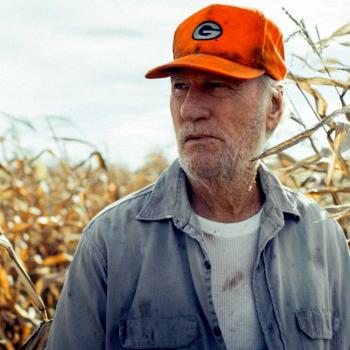The most vivid answer from Daniel is that you draw seemingly arbitrary boundaries that on a regular basis remind you and those around you that you are deeply, permanently, ineradicably different from your surrounding culture -- even at great risk and cost. For Daniel and his friends, the line is drawn at the king's table. They don't eat the king's lavish spread of meat and rich food. At another point in Daniel, it happens with respect to time. The weekly hour of prayer, in front of an open window, facing the city from which Daniel has been brought into exile. There are different ways to enact this resistance, but a community that does not enact that resistance will become completely assimilated. They will come to have Babylonian hopes and fears as well.
So the word faithful is not wrong; it just requires some additional unpacking, that this is going to require costly practices of resistance to cultural patterns that will help us preserve our sense of distinctiveness. Clearly one of the areas where evangelicals either will model a radical resistance or will be assimilated is in the area of sexuality. Either our bodily practice of sexuality will be markedly different from our culture -- or it will not. If it is different, we will meet tremendous resistance. The choice to be chaste is mocked by our culture. And yet that's what Christian faithfulness requires. And it requires a kind of chastity from married people as well, that our culture maybe does not mock in quite the same way, but it sneers at. We will either resist or we will be assimilated in this area.
We should talk about what it means to be culturally mainstream, because evangelicalism is becoming culturally mainstream, in a way that it has not been for maybe 130-140 years. What are the consequences and costs of that, and how ought we as believers to respond?
Well, what did it mean to be culturally mainstream in the 19th century? That was an age of institution building. America, coming out of the Civil War, was trying to build a rich and sustainable society. So what it meant to be culturally mainstream in the 19th century was to build institutions, which evangelicals did with great energy and to lasting effect. What it means to become culturally mainstream in a consumer culture is to become very exceptionally accomplished consumers.
American religion today is deeply shaped by consumer culture. The places where evangelical Christianity is most apparently flourishing are where it has made the most accommodations to consumer culture. It's not all bad that we have learned how to be relevant to the culture we find ourselves in. An age of institution building had its own blind spots and weaknesses. However, I think an age of consumption as the dominant metaphor for what it means to be human, that says you are at your most human when you are purchasing and enjoying what someone else created, if that's played out over a few generations, I think it's going to leave us thoroughly impotent to bring into the world the kind of change that God would have his people bring.
The other problem of being culturally mainstream is that you start to take for granted, and like and appreciate and want to preserve, the world that has placed you at its center. That's not all bad, because there are things in our culture worth preserving. But there are also deep injustices in the world and in our own society; if we are simply polishing the brass, we are not being the kinds of agents of shalom and justice that God calls his people to be.
It strikes me that we have not yet mentioned the name, Jesus Christ. How does Christ play into this? What are strategies of bringing Christ forth culturally and through creative power that will work in the years to come?
I'm glad you asked. The most important thing in the Christian life is to become formed into Christ's image. Or let me be more concrete. There is a prayer that I pray every day, many times a day. It was pretty much the first thing I thought this morning, this prayer. It's three sentences long, and it doesn't sound like a prayer:
"There is another who lives in me. There is another who completes me. There is another whose righteousness is mine."
I pray those three sentences over and over; my goal is to pray them so often that I pray them without thinking them. It expresses that my life is not my own. I died and I was raised and the one who lives in me now, in a mysterious way, is not me alone but Christ living in me. The only real hope for Jesus Christ being real to our culture is for him to be real in the lives of the people who have been buried and raised in him.
Now, we could talk about strategies for adjusting Jesus' public image. For one thing, we certainly should be telling the story. Many of our neighbors don't know who he was, what he said, what he did, why he did it. But the most important thing is that every Christian should realize that we are not asked to live this Christian life on our own strength, by our own natural abilities. We are actually intended to live the life that Jesus lived and lives, not to live our own lives. And we live his life by choosing suffering when we could choose comfort, by daily practices of repentance and trust, by putting ourselves in places where only if his life is at work in the world can we hope to come out alive ourselves. This is how we let Christ live in us.




